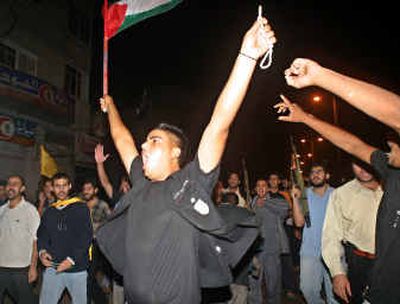Arafat’s health raises concerns

RAMALLAH, West Bank – Top Palestinian leaders gathered early today at Yasser Arafat’s battered headquarters here amid reports that the longtime Palestinian leader’s health was deteriorating rapidly.
Arafat’s top spokesman denied that the situation was grave, however, saying the 75-year-old Palestinian president’s condition was “stable,” though he was “in need of rest and more medical treatment.”
“Not at all, not at all,” Arafat’s spokesman Nabil Abu Rdeinah responded to a shouted question about whether Arafat had lost consciousness earlier in the day.
Confusion reigned Wednesday night as reporters, Palestinian officials and concerned Palestinians swarmed to the heavily guarded compound where Arafat has been confined for nearly three years of Palestinian uprising under the threat that if he were to leave Israeli troops wouldn’t allow him to return.
Israel Radio reported that Israeli officials had granted an emergency request from Palestinian officials to allow Arafat’s wife, Suha, to join him in Ramallah. The report said she was expected to cross into the West Bank from Jordan Thursday.
Israeli government spokesman Ranaan Gissin said Israeli Prime Minister Ariel Sharon had given permission for Arafat to be transferred to a hospital in Ramallah or abroad, should that be necessary.
Top leaders of Arafat’s Fatah movement, including Palestinian Prime Minister Ahmed Qureia and the executive secretary of the Palestinian Liberation Organization, Mahmoud Abbas, rushed to the compound to be by his side.
Tunisian doctors departed the compound; Jordanian doctors were said to be coming today.
A shaken-looking Labor Minister Ghassan Khatib left the compound, saying he had no comment on Arafat’s condition.
Arafat is the president of the Palestinian Authority and head of the PLO. Should he become incapacitated or die, Abbas would likely ascend to the top spot of the PLO; Qureia would lead the PA until a successor is elected.
Rdeinah denied reports that an “emergency” triumvirate had been formed consisting of Abbas, Qureia and Salim al-Zanoun, another Fatah official.
Concerns about Arafat’s health have been growing throughout the week, as the Palestinian leader remained out of the public eye for days. Palestinian officials said the former guerrilla leader was recovering from a bout of stomach flu, but he underwent an endoscopy Monday after complaining of stomach pains, and there has been speculation that he may be suffering from a gallstone or cancer.
On Wednesday, as rumors spread about his condition, the streets outside his headquarters, known as the Muqata, grew crowded under a brilliant moon as the curious and concerned gathered.
“I heard about the illness of our president, so I came to see what was happening,” said Taha Faqeeh, a general director in the Palestinian Interior Ministry.
“Our president is an old man. Part of the reason for his bad health are the bad conditions he lives under. … God willing, he will be OK.”
Arafat has lived in the small, concrete, British Mandate-era building that contains his office and one personal room since the second year of the uprising, which began in September 2000.